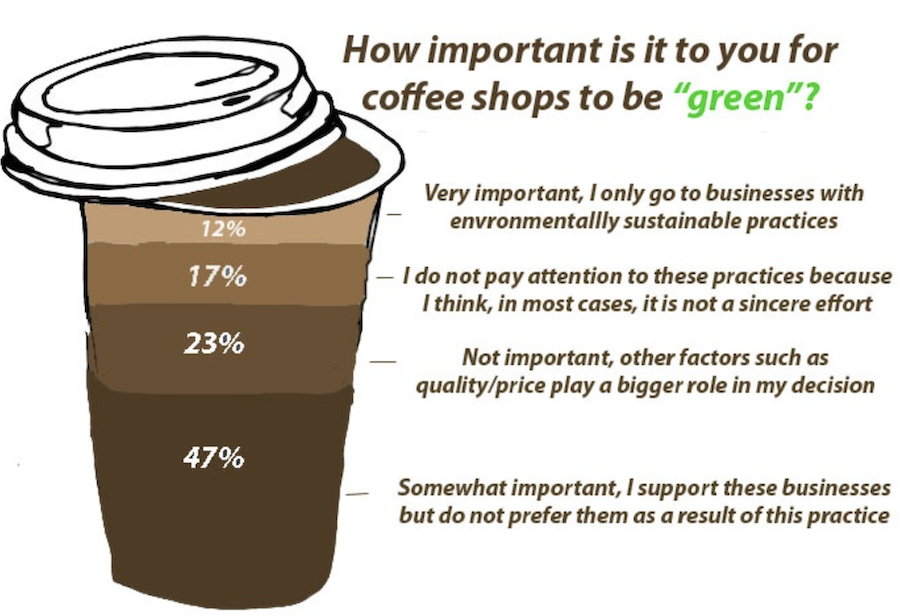Julie
Recent Posts
Article first appeared on Nation's Restaurant News (nrn.com).
Poll of 105 coffee drinkers:
Customers traditionally choose a restaurant on the basis of factors such as quality, convenience, service and value.
Today, a growing number are using an additional benchmark as well — the sustainability of its menu, business practices and supply chain.
Customers ask questions like these:
- Where do the ingredients come from?
- How are they processed and handled?
- What effect does that have on our air, water and soil?
- Were the farmers or producers compensated fairly?
Such considerations affect where they decide to eat and which foods and beverages they order.
Indeed, environmental sustainability is a Top 10 trend in the National Restaurant Association’s What’s Hot 2023 Culinary Forecast. All told, several of the top 10 trends in the forecast are connected to sustainability, including locally grown produce and food waste reduction/management.
The NRA’s 2023 Restaurant Industry Forecast reports nearly half of consumers say they would dine at a restaurant offering sustainable or organic food. Younger consumers are especially attuned. More than half of the respondents ages 18 to 24 said they look to frequent restaurants that practice sustainability.
Another report—this one by the market research firm Packaged Facts—deemed sustainability a mainstream issue for the restaurant industry.
“Restaurants and companies that help lead the way on the environment will likely reap dividends in the form of the patronage of an approving mainstream public,” said the Packaged Facts report.
In addition, survey data in the report indicated groups such as women, higher-income consumers, young adults ages 25 to 34 and families as receptive to sustainability menu claims and sourcing terms.
As a result, an increasing number of foodservice operators are making sustainability an important element of their restaurant operations. The Specialty Coffee Association of America has established the SCAA Green Guide, a series of digital booklets designed to help operators reduce waste and conserve energy. The modules offer tips on topics such as how to update lighting and refrigeration, and reduce water usage without impacting the flavor of the coffee.
The spotlight on sustainability goes beyond the four walls of the restaurant to shine on vendors, too.
“Most restaurant operators want assurance that the suppliers they do business with are aligned with their own sustainability goals,” says William Culpepper, senior marketing manager at Royal Cup Coffee & Tea, where he heads the sustainability program.
Royal Cup measures its sustainability success using the “triple bottom line” of social responsibility, economic stability and environmental stewardship.
The company’s efforts kicked into higher gear when one of its customers, a major hotel chain, teamed up with CDP, a not-for-profit organization that provides a system for companies to measure and manage environmental information. Royal Cup was asked to analyze and disclose the impacts of its products and business practices.
“We have come a long way in being able to track our carbon footprint,” says Culpepper. “The first step in the sustainability journey is knowing where you are.”
A number of Royal Cup coffees bear third-party certifications of commitment to the environment and social responsibility, such as Rainforest Alliance, fair trade and organic. Incidentally, organic coffee was one of the top four non-alcoholic beverage trends in the What’s Hot forecast.
In keeping with fair trade principles, Royal Cup supports the efforts of coffee farmers and cooperatives to earn a sustainable livelihood. “We always want to ensure we are paying a fair price for the product,” says Culpepper.
The commitment to social responsibility extends beyond the coffee lands to embrace the company’s 800-plus U.S. employees and their communities. For instance, Royal Cup donates 5 percent of pretax profits to charity annually, takes part in corporate volunteering and partners with firms that are owned by women and minorities.
Other moves at Royal Cup have boosted energy efficiency and reduced emissions, such as adding fuel-efficient vehicles to the company fleet and using routing software to find the shortest delivery routes. In addition, LED lighting was installed at company headquarters to cut energy consumption.
Actions like those that reduce the carbon footprint can also benefit the company by lowering costs.
“In many cases, we have proven that those are not only the right things to do, but also good business,” says Culpepper.
Looking ahead, Culpepper sees “a tremendous amount of enthusiasm” for continued improvement in sustainability at Royal Cup.
“It is not just a feel-good notion,” says Culpepper. “We want to weave sustainability into all of our practices and make it truly part of our core business.”
Topics: Training
Every month, millions of people use Facebook Events to help them discover and connect with their communities. Your event should be one of them. Maybe you’re hosting an art opening, offering a unique coffee tasting, or planning a customer-appreciation party. Facebook events allow you to quickly create a listing, send out invites, and keep guests updated on every detail. Here are some best practices to consider the next time you launch a Facebook event.
Topics: Marketing
As a business owner, workplace monitoring to keep an eye on employee activities is your prerogative when they are engaged in work for your café or restaurant. How you go about it will shape employee-management relationships, and could greatly influence productivity.
Topics: Staff Management
According to research firm Mintel, 29.2 million Americans have posted a food or drink picture at a restaurant in the past month. A full 14% of these folks have posted a positive comment on a restaurant’s social media page in the same period. But despite all the rave reviews, only 17% of those polled were influenced by a positive review to eat at a certain establishment, possibly due to the right promos.
Topics: Marketing
It's hard to know when to give raises to employees. Words of thanks go a long way, but monetary rewards and gifts go even further in retaining valued employees. While most restaurant and café owners can’t afford to give out annual raises (except perhaps irregularly, based on the merit of an exceptional employee), paying an above-market wage can actually save you money.
Topics: Staff Management
As restaurants across the country experience the slight uptick in business that comes with Daylight Savings time, it’s worth considering what will keep customers coming back to a particular establishment. According to ongoing industry research by market-research firm Mintel:
- Cleanliness is paramount to 96% of restaurant goers
- Menu selection and variety are most important to 94% of folks,
- Comfortable seating is the most important component of a visit-worthy atmosphere for 91% of those surveyed.
Topics: Marketing




.png)